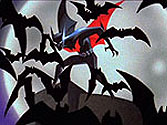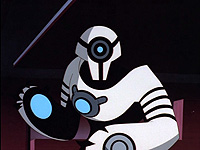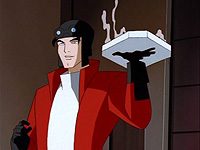|
||
|
| Credits | Cast | |
Written by Stan Berkowitz Directed by Curt Geda Music by Lolita Ritmanis Aniimation by Koko/Dong Yang |
Will Friedle as Terry McGinnis Kevin Conroy as Bruce Wayne Sherman Howard as Derek Powers Chris Mulkey as Shriek |
Gregg Berger as Computer Lauri Johnson as Nurse Ian Patrick Williams as Andrews |
|
But one art is not mentioned in the above list: sound and sound effects. It is an odd omission since, as Robert Bresson has noted, sound is the third dimension in film, providing the depth and space that makes flat images full. (Do you doubt this? Primitive talkies are unwatchable not because of the camerawork or acting styles, but because of the clumsy sound.) So in how many movies are we made conscious of the artificial manipulation of sound, as we are made aware of the artifical manipulation of the image? Very very few. Sound, as the indispensible Batman Animated is at pains to point out, is one area the series works at hard and successfully. And in "Shriek" the sound artists are invited to go wild, to smother us with effect and ingenuity. (The villain is himself a sound engineer, relying on the disruptive and disorienting power of sound.) And they don't disappoint: The eerie whispers that plague Wayne in the hospital, and the final fight, in which Shriek selects and edits out ambient noises, are powerful and fascinating. And someone clearly has realized that sound is sometimes most oppressive in its absence: That final fight is, finally, conducted almost entirely without sound or music, and the pressure of the silence almost makes our ears pop.
The end leaves Shriek deaf, not dead, and thereby leaves the promise of a fuller exploration of the possibilities for the manipulation of sound. Of course, Shriek will be able to build himself a new sound system to give himself a new sense of hearing—and it will be one entirely under his own control. So why not tell the next Shriek story entirely from within his experiences, giving us the sounds as they come to him—selected, edited and appreciated as only a deaf aesthete would have them? |
|
|
|
Related Episodes |
What Others Are Saying ... |
| Back to Sentries of the Last Cosmos |
Forward to Sneak Peek |

 Shriek
Shriek
